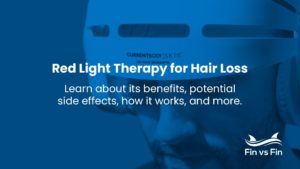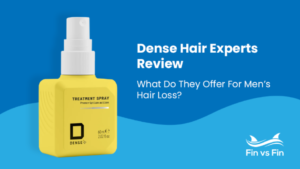Vaping can negatively impact hair health by contributing to hair thinning, shedding, premature hair loss, and scalp itchiness. The chemicals in vape liquid have been linked to increased inflammation, oxidative stress, and reduced blood flow to the hair follicles, which may cause hair loss. However, further research is required to establish a definitive link between vaping and hair loss.
Genetics, hormonal changes, stress, and older age are all known causes of hair loss. Vaping may exacerbate hair loss triggered by these factors by inhibiting the flow of oxygen and nutrients to the hair follicles and increasing cell damage from free radicals.
Read on to learn more about the potential connection between vaping and hair loss. In addition, we discussed strategies for hair restoration with Dr. Jonathan Rick, a board-certified dermatologist.
The Link Between Vaping and Hair Loss
Though vaping and smoking cigarettes, cigars, or pipes can all contain nicotine, they differ in a few key ways. Vaping was first introduced as a safer alternative to cigarettes, as it involves heating a liquid, rather than burning tobacco, which presents various health risks.
While vape liquid doesn’t contain tobacco, it contains other chemicals that could contribute to hair loss, including:
- Nicotine, a vasoconstrictor that reduces blood flow to the hair follicles and contributes to oxidative stress and hair follicle damage
- Tetrahydrocannabinol (THC), an active chemical in marijuana vapes that may damage hair strands
Many other chemicals are found in vape liquids, including formaldehyde, acetaldehyde, nitrosamines, heavy metals, reactive oxygen species (ROS), and flavoring chemicals.
Formaldehyde
Formaldehyde is a known human carcinogen. Formaldehyde is found in vape liquid, as well as many cosmetics. While formaldehyde from vaping hasn’t been directly linked to hair loss, chemical straighteners with formaldehyde have been found to increase cuticle irregularity, increase scalp inflammation, and contribute to hair loss.
Acetaldehyde
Acetaldehyde is a highly reactive, toxic substance found in many vape liquids that contributes to cellular damage. It’s been found to stimulate the release of mast cells, a type of immune cell that triggers inflammation. Hair follicles are highly susceptible to the effects of immune cells, meaning that acetaldehyde may influence the follicles’ health and function. Acetaldehyde has also been linked to skin itchiness and inflammation, which can affect the scalp.
Nitrosamines
Nitrosamines are organic compounds and known carcinogens. Research has directly linked nitrosamines to hair loss in mice. Further research is needed to determine if nitrosamines in vape liquid directly contribute to hair loss in humans.
Heavy Metals
Heavy metals may contribute to chronic telogen effluvium, a common form of hair loss characterized by excessive shedding.
Reactive Oxygen Species
Reactive oxygen species, a class of chemicals, cause oxidative stress and free radical damage to cells throughout the body, including in the scalp.
Does vaping stop hair growth?
While vaping doesn’t stop hair growth altogether, the chemicals in vaping liquid, namely nicotine, can inhibit hair growth, damage hair follicles, and contribute to premature hair loss.
How Does Nicotine Cause Hair Loss?
Nicotine contributes to hair loss in three major ways:
Nicotine is a vasoconstrictor, meaning that it causes the blood vessels to contract. This reduces the flow of oxygen and nutrients to the hair follicles, potentially inhibiting hair growth.
Nicotine and vaping chemicals directly increase oxidative stress and inflammation, which damage cells throughout the body. Over time, oxidative stress and inflammation can contribute to premature hair loss by damaging the cells that make up the hair follicles, inhibiting their ability to function properly.
Nicotine may disrupt hormonal balance by increasing androgen levels. Increased levels of dihydrotestosterone (DHT), an androgen that’s derived from testosterone, is a major contributor to androgenic alopecia, or male/female pattern hair loss.
Does Nicotine Increase DHT Levels?
DHT is an androgen that contributes to voice deepening, increased body hair, and muscle mass. It also plays a key role in the development of androgenic alopecia. An estimated 10% of testosterone in adults is turned into DHT. When DHT is in your bloodstream, it can bind to receptors on your scalp’s hair follicles, causing them to shrink.
Some studies indicate that nicotine may increase androgen levels and contribute to androgen-related hair thinning. However, further research is needed.
Nicotine can promote balding by reducing circulation to the hair follicles, increasing free radical damage, and contributing to hormonal imbalance.
Can Vaping THC Cause Hair Loss?
Only one study published in 2007 has directly linked THC to hair loss. This study found that THC can accumulate on hair shafts, leading to strand damage.
Additionally, THC has been found to increase levels of cortisol, the primary stress hormone, in the body. Stress is known to contribute to hair loss by affecting hair follicle function and the hair cycle. It also reduces the production and speeds up the degeneration of skin elements like hyaluron and proteoglycans, which are essential for healthy hair growth.
Who Is at Risk of Hair Loss From Vaping?
While research is lacking on the prevalence of hair loss among vape users, a 2020 study found that 425 out of 500 smokers between the ages of 20 and 35 years old experienced hair loss. Only 200 out of 500 non-smokers experienced some form of hair loss.
Individuals who frequently vape are at a higher risk of hair loss and thinning than those who use it occasionally or infrequently. The more frequent the exposure to nicotine, THC, and other chemicals, the more likely the user is to experience the effects of blood vessel constriction, oxidative stress, inflammation, and hormonal disruption. These effects may include hair shedding, thinning, receding hairline, and bald patches.
Additionally, individuals who vape, who also have other risk factors for hair loss may be at a higher risk of shedding, balding, and thinning.
Other risk factors for hair loss include:
- Hereditary factors and a family history of hair loss
- Older age
- Recently giving birth
- Illness, recovering from surgery, or other major stressors
- Hormonal imbalance
- Scalp infections
- Taking certain medications or undergoing certain cancer treatments
- Nutritional deficiencies
- Underlying medical conditions, like thyroid disease and scalp psoriasis
Will Hair Loss From Vaping Grow Back?
Hair loss that’s solely caused by vaping can grow back by quitting vaping and addressing other contributing factors, like nutritional deficiencies. When the hair follicles are no longer exposed to nicotine, THC, and the other chemicals in vape liquid, your hair may gradually start to grow back. However, this may vary from person to person.
Related reading: Zero Smoking Cessation Review- Can It Help You Quit for Good?
Is Nicotine Hair Loss Reversible?
If you stop using nicotine products altogether, hair loss from nicotine is reversible. However, if other, irreversible factors are also contributing to hair loss, like genetics, you may want to consider discussing prescription hair loss treatments with your healthcare provider.
Related reading: Finasteride vs. Dutasteride- Which Is Better for Hair Loss?
How to Stop Vaping Hair Loss
The nicotine in vape liquid is highly addictive, making it difficult to stop vaping. However, there are some proven strategies that may help you stop vaping, including:
- Nicotine replacement therapy, including nicotine gum, patches, inhalers, sprays, and lozenges
- Behavioral therapy, which can help people overcome unhealthy substance use with the help of mental health coaches, counselors, and doctors
- Prescription medications like bupropion and varenicline, which are FDA-approved to reduce cravings and withdrawal symptoms
Some people may also successfully quit vaping “cold turkey,” although this may be difficult for many individuals.
After stopping vaping, you can thicken your hair and promote regrowth with hair regrowth methods including:
- Hair thickening products, like pomades, shampoos, and conditioners
- Hair supplements
- Dietary adjustments
- Stress management
- Scalp massage
- Topical minoxidil
- Topical finasteride and oral finasteride
- Laser caps
- Ketoconazole shampoo
- Surgical procedures, like a hair transplant
- Platelet-rich plasma (PRP) injections

A Word From Our Expert
— Dr. Jonathan Rick
Like all treatments, hair regrowth approaches require knowledge of costs and benefits. Thankfully most treatments are very safe, but we still need to strike an acceptable balance between financial cost and known clinical efficacy. I usually start with topical minoxidil and then escalate to topical finasteride if needed. Both of these have well-documented improvements for most patients and are affordable. I then discuss Nutrafol or similar products in addition to minoxidil and finasteride. For people that have reduced hair density, but not complete loss of hair, I will bring up platelet-rich plasma, but this represents a significant escalation of cost. Once we have stopped hair loss, we have the option of pursuing a hair transplant. These are significant surgical procedures with significant out-of-pocket costs.
Like all things in medicine, there is not a "one size fits all" approach to hair loss and a thorough evaluation is needed for some cases.”
Quitting vaping can also provide a range of health benefits including:
- Reduced risk of premature death
- Reduced risk of cardiovascular disease, heart disease, COPD, cancer, and poor reproductive health outcomes
- Reduced inflammation
Summary
While further research is needed to confirm a clear link between vaping and hair loss, vape liquid contains chemicals that can contribute to hair thinning, shedding, and scalp inflammation. The nicotine in vape liquid is known to compromise hair health by reducing blood circulation to the hair follicles.
The most effective strategy to prevent hair loss from vaping is to quit vaping and smoking altogether. To encourage hair regrowth after quitting vaping, speak with your healthcare provider about FDA-approved hair loss treatments like finasteride and minoxidil, nutritional hair loss supplements, thickening hair products, and dietary adjustments.
Frequently Asked Questions (FAQ)
Can thin hair become thick again?
Thin hair can become thick again with minoxidil, finasteride, thickening hair products, hair supplements, and lifestyle adjustments. Speak with your doctor if you are experiencing hair loss and would like to begin treatment.
Related reading: 14 Ways to Get Thicker Hair Using Natural and Scientifically Proven Methods
Is hair loss reversible?
Some forms of hair loss are reversible or can be improved with lifestyle changes, like quitting vaping, and treatments for hair loss.
How long does it take for vape to get out of your hair?
Nicotine from vaping remains in the body for 3 to 4 days, but a metabolite of nicotine called cotinine can remain for up to 3 weeks after exposure.
How long does vaping nicotine stay in your hair?
Vaping nicotine may stay in your hair for up to 3 weeks.
Is vape worse than smoking?
Vaping is less harmful than smoking, as it doesn’t contain tobacco, but has still been linked to many adverse health effects.
Curious where to start?
We’ve personally tested hundreds of hair regrowth products for men. Find out which work best (and enjoy exclusive discounts!) in our hair loss newsletter.

Related Reading

Tretinoin and Hair Loss: Does It Help Regrow Hair?
Key Takeaways Topical tretinoin may support hair growth by increasing circulation to the scalp and boosting cell turnover. Up-to-date clinical research indicates that tretinoin can

Red Light Therapy for Hair Loss: Does It Promote ReGrowth?
Key Takeaways Red light therapy can safely and effectively treat hair loss in some individuals. It typically takes four to six months to see results

Hers vs. Rogaine vs. Nutrafol: Which Is Best for Hair Loss?
Our Top Picks Best for Comprehensive Hair Care: Hers, | Jump to Review Best for Convenient Accessibility: Rogaine, | Jump to Review Best for Natural Ingredients:

How to Get Oral Minoxidil Online: A Complete Guide
Key Takeaways Oral minoxidil is a good option for individuals with androgenic alopecia who experience side effects from topical minoxidil or who are not seeing

Does High Blood Pressure Cause Hair Loss?
Key Takeaways While some studies do show a potential association between high blood pressure and hair loss, more research is still needed. High blood pressure

Dense Hair Experts Review: What Do They Offer for Men’s Hair Loss?
Dense Hair Experts Overview Price: £59.99 (or £47.99 on subscription) Prescription products: Finasteride, dutasteride OTC products: Minoxidil, shampoo, conditioner, vitamins, styling products Active ingredients: Finasteride,













